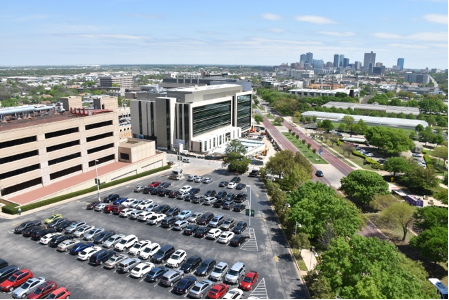The Liaison Committee on Medical Education (LCME) granted TCU and UNTHSC School of Medicine Provisional Accreditation, bringing the medical school one step closer to full accreditation.
“This is a tremendous step in solidifying the medical school’s role as a critical partner in making Fort Worth and North Texas a place where medical innovation in education and health care occurs,” Stuart D. Flynn, M.D. the medical school’s founding dean, said in the announcement.
“We are extremely humbled and grateful that the LCME favorably assessed our training mission to graduate physicians who will deliver compassionate care and lead into the rapidly changing health care environment, despite their not being able to visit our campus in-person due to the COVID-19 pandemic,” Flynn said.
Members of the LCME voted at their meeting in mid-June to grant provisional accreditation to the medical school.
A team of accreditors from the LCME met virtually with senior leadership, faculty and students during a virtual site visit in February before making the decision.
The LCME awarded the school of medicine preliminary accreditation in October 2018 allowing the school to welcome its first class of 60 medical students in July 2019. The second cohort of 60 students arrived July 2020 after the school received more than 4,000 application submissions.
Applications to the school of medicine doubled in 2021 to more than 8,000 applicants and the school will welcome its third group of 60 medical students on July 12. The next step in the accreditation process is full accreditation, which is expected in late 2023.
H. Paul Dorman, chairman and CEO of Fort Worth-based DFB Pharmaceuticals, donated the cost of tuition for the first year of class for the inaugural class in 2019, who are known as the Dorman Scholars. Recently, an anonymous donor couple funded tuition for the 2021-22 academic year for the entire class of 60 students at the School of Medicine that began medical school in July 2020.
“We are extremely thankful for the support from our community members in helping us build a new model of medical education in Fort Worth,” Flynn said. “Their support has given our medical students comfort in decreasing their cost to attend medical school and allows them to fully immerse themselves into their training. This is positive for our students, our community, and ultimately for the patients our graduates will serve.”
The announcement said the innovative curriculum at the School of Medicine focuses both on developing Empathetic Scholars, physicians able to “walk in a patient’s shoes with compassion” while embracing and leading major drivers in the future of medicine, including artificial intelligence, technology monitoring patient health and disease, and genomics.
Each student also does a four-year research thesis, nurturing life-long inquiry and learning.
To date, 120 students have attended classes on TCU and UNTHSC campuses and participated in patient care with affiliates in Fort Worth and North Texas.
Addressing the COVID-19 pandemic the students, faculty and staff at the medical school supported the North Texas region in numerous ways including the Fort Worth PPE Drive, Virtual Blood Drive, Back-to-School Drive, children’s book reading project and more.
The medical students were also able to administer approximately 19,000 COVID-19 vaccines to Tarrant County residents over a 12-week span during the TCU and Baylor, Scott & White COVID-19 Drive-Through Vaccination Clinic on the TCU Campus.
In February 2020, Baylor Scott & White All Saints Medical Center Fort Worth and the TCU and UNTHSC School of Medicine announced their collaboration on starting a new Accreditation Council for Graduate Medical Education (ACGME)-accredited physician resident training program.
The collaboration, that will eventually train more than 150 physicians annually, will not only improve health and the delivery of care in North Texas, it will also address the ever-increasing physician shortage in Fort Worth and beyond, the medical school news release said.
Texas Christian University and the University of North Texas Health Science Center formed a unique private-public partnership to form the allopathic medical school in July 2015.
By 2030, the annual economic impact of the medical school is estimated to reach $4 billion, and the school is expected to generate about 31,000 jobs for North Texas, according to a Tripp Umbach study.
The school’s current Founding Donors include Alcon, Amon G. Carter Foundation, Anita and Kelly Cox, Baylor Scott & White, The Burnett Foundation, Cook Children’s, Texas Health Resources, H. Paul Dorman, Arnold and Harriette Gachman, Dr. John and Priscilla Geesbreght, Sid W. Richardson Foundation, Rebecca and Jon Brumley, The Morris Foundation, Martha Sue Parr Trust, Tartaglino Richards Family Foundation, Thomas M., Helen McKee, & John P. Ryan Foundation, as well as three anonymous donors.






